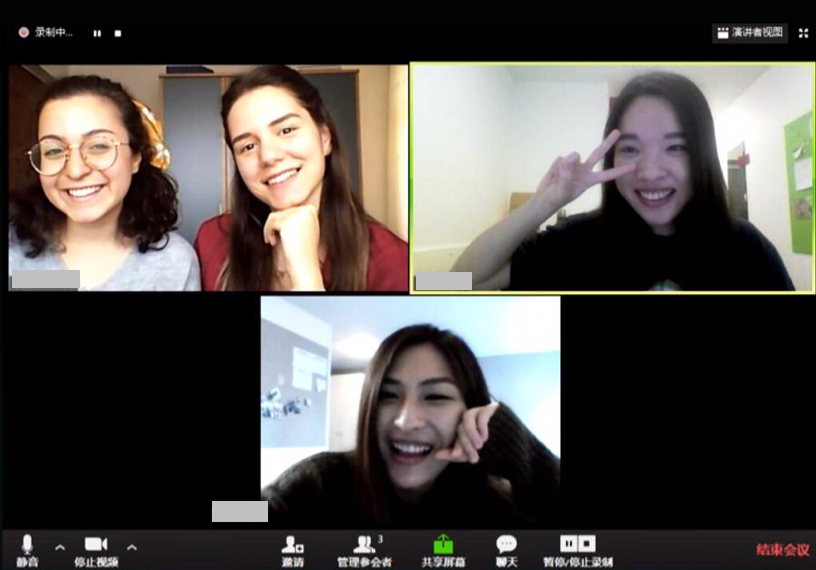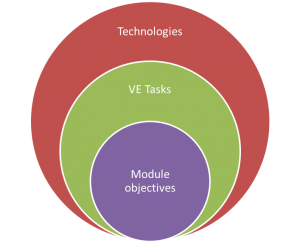Dr Müge Satar, Lecturer in Applied Linguistics and TESOL
School of Education, Communication and Language Sciences
Humanities and Social Sciences
What did you do?
MA in Applied Linguistics and TESOL students at Newcastle collaborated online with English language teacher trainees at TED University, Turkey to complete three tasks designed to support critical digital literacy over 6 weeks (Feb-March 2019) using different online tools: Zoom, Padlet, and Google Slides.
Who is involved?
- MA in Applied Linguistics and TESOL students taking the Computer-Assisted Language Learning module (ALC 8022) at Newcastle University
- English Language Teaching 3rd year students (volunteers) taking the Technology Enhanced Language Learning module at TED University, Turkey
- Lecturers: Dr. Müge Satar and Dr. Zeynep Bilki

How did you do it?
Both Zeynep and I attended 4-week online training on Virtual Exchange provided free of charge by the Erasmus+ EVOLVE project. Information about the training can be found here: https://evolve-erasmus.eu/training/
During the training, with hands on guidance and support, we identified our aims for the exchange, the tasks, and the technologies we used in the exchange (Figure 1). We designed three tasks, and increased the difficulty of cognitive, technological, and multimodal skills required to complete each task: The first task involved asynchronous information exchange on a Padlet board, the second synchronous collaboration using Zoom and Google Slides, and the third synchronous evaluation of technologies via Zoom. We also compared the composition and requirements of the groups.

Figure 1
Student Voice
‘I learned new terms about e-literacy and I think they will be very useful for my future career in terms of creating this type of project.’
‘It was a great experience for me to connect with people from different cultures, different backgrounds, and nationalities.’
‘I believe that we engaged in the task well. We worked well, and we managed to talk in detail about intercultural literacy – specifically about it is essential to be polite and understanding, how one person’s ‘normal’ is not necessarily another person’s ‘normal’, and that is important to consider that communication breakdowns may not necessarily occur due to cultural differences, but individual ones (therefore, it is important not to generalise and stereotype others).’
‘Video-conference tools are really great for getting people together who need to work on something and who physically cannot be in the same place.’
‘This project encourages respectful engagement between individuals and groups with diverse cultures.’
Feedback from students
Why did you do it?
Virtual Exchange (VE) is “an educational practice which involves the engagement of groups of learners in extended periods of online intercultural interaction and collaboration with international peers as an integrated part of their educational programmes and under the guidance of educators and/ or facilitators” (The EVALUATE Group, 2019, p.4).
Both modules offered at Newcastle and TED aim to develop English language teacher trainees’ technological and pedagogical skills. We wanted to use the exchanges to support internationalisation of our curricula. We also aimed to develop our learners’ transversal skills, e.g. team work, intercultural communication, IT, and multimodal literacy required to live and work internationally.
Virtual exchange, also known as telecollaboration, has a long-standing tradition in the field of language teaching. Thus, the exchanges offered the participants experiential learning opportunities as future teachers while we, as lecturers, modelled teacher practices in designing and implementing virtual exchange, including task design and tool selection. The activities also allowed us to discuss issues around critical digital literacy, online privacy, and informed consent in participating and recording virtual exchanges.
Does it work?
Both Zeynep and I have received excellent feedback from the students, who expressed how much they enjoyed their exchanges. Many students in my module chose the topic of virtual exchange for their written assignment (essay), and most of them developed online materials using the technologies they used in their virtual exchanges for their computer-based assessment.
We secured some funding from the TED University Scientific Projects Fund to investigate evidence of critical digital literacy in learners’ online exchanges. We will present our initial results at an international conference (EuroCALL 2019), and write a peer-reviewed international journal article.
Volunteering students also completed pre- and post-questionnaires designed and administered by the EVOLVE project https://evolve-erasmus.eu, the results of which are not released yet.
Contact details
